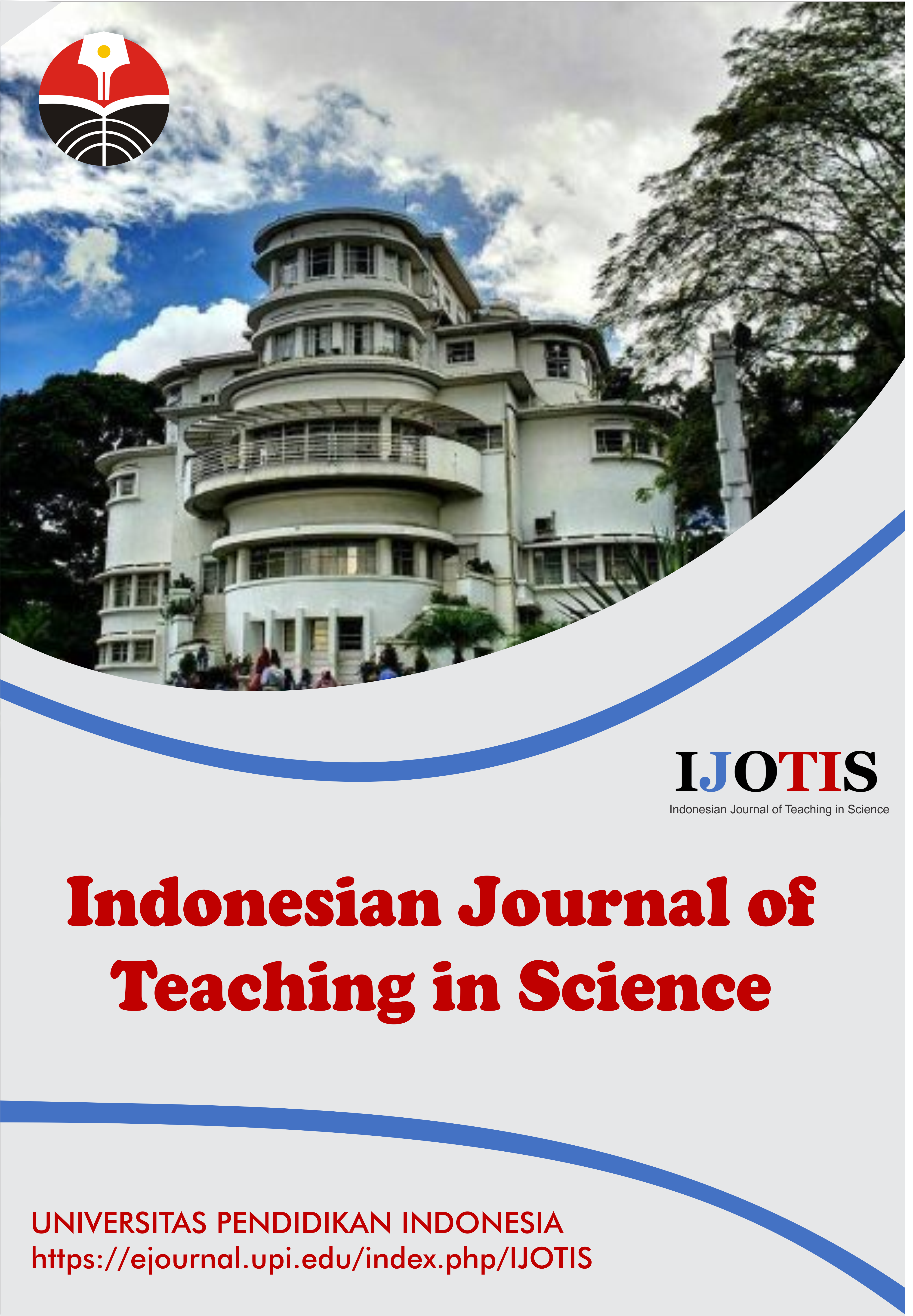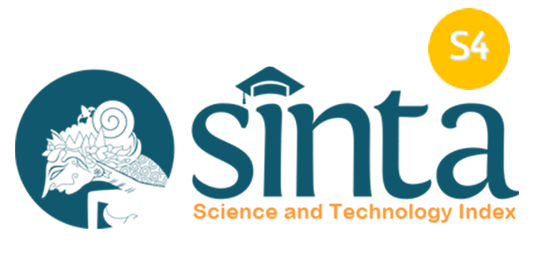Context Evaluation in Nanotechnology Courses: A Context, Input, Process, and Product (CIPP) Model Perspective
Abstract
This study aims to evaluate aspects of the project-based nanotechnology lecture context to understand the description of the background conditions and course requirements that support the effectiveness and relevance of the curriculum applied to learning. The evaluation model used is Context, Input, Process, Product (CIPP), with a qualitative analysis design for documents such as Semester Learning Plans (SLP) and learning outcomes assessments. The evaluation results show that the existing curriculum and learning outcomes instruments do not fully reflect the needs of the growing nanotechnology industry. These findings indicate a mismatch between learning outputs and industry expectations, suggesting the need for regular curriculum updates and the integration of real applications and industry cases in teaching methods. Obstacles faced include students still not being familiar with the application of project-based laboratory inquiry learning and a lack of related knowledge. This study provides recommendations for strategic improvements in the curriculum aimed at increasing the relevance and effectiveness of nanotechnology learning, in line with the latest innovations and developments in the field.
Keywords
Full Text:
PDFReferences
Abdul, R., Zubaidi, M., Mirnawati, M., and Mobo, F. D. (2022). Team-based project learning model on the MBKM course in the Department of Nonformal Education. Journal of Nonformal Education, 8(2), 208-221.
Almulla, M. A. (2020). The effectiveness of the project-based learning (PBL) approach as a way to engage students in learning. Sage Open, 10(3), 2158244020938702.
Anazifa, R. D., and Djukri, D. (2017). Project-based learning and problem-based learning: Are they effective in improving students’ thinking skills?. Jurnal Pendidikan IPA Indonesia, 6(2), 346-355.
Baghoussi, M., and Zoubida El Ouchdi, I. (2019). The implementation of the project-based learning approach in the Algerian EFL context: Curriculum designers’ expectations and teachers’ obstacles. Arab World English Journal (AWEJ), 10(1), 1-12.
Barak, M., and Usher, M. (2019). The innovation profile of the nanotechnology team projects of face-to-face and online learners. Computers & Education, 137, 1–11.
Carvalho, A. R., and Santos, C. (2022). Developing peer mentors’ collaborative and metacognitive skills with a technology-enhanced peer learning program. Computers and Education Open, 3, 100070.
Chintya, J., Haryani, S., Linuwih, S., and Marwoto, P. (2023). Analysis of the application of the project based learning (PjBL) learning model on increasing student creativity in science learning in Elementary Schools. Jurnal Penelitian Pendidikan IPA, 9(6), 4558-4565.
Chu, C., Dewey, J. L., and Zheng, W. (2023). An inorganic chemistry laboratory technique course using scaffolded, inquiry-based laboratories and project-based learning. Journal of Chemical Education, 100(9), 3500-3508.
Curreli, M., and Rakich, S. S. (2020). An integrated approach to teaching and learning nanotechnology: the Omni Nano model. Journal of Research in Innovative Teaching & Learning, 13(1), 141-145.
Damayanti, N. K. A., Martha, I. N., Gunatama, G., and Hum, M. (2014). Pembelajaran menulis teks anekdot berpendekatan saintifik dengan model pembelajaran berbasis proyek (project based learning) pada siswa kelas X Tata Kecantikan Kulit 1 di SMK Negeri 2 Singaraja. Jurnal Pendidikan Bahasa dan Sastra Indonesia Undiksha, 2(1), 14-20.
Doo, M. Y., Bonk, C., and Heo, H. (2020). A meta-analysis of scaffolding effects in online learning in higher education. International Review of Research in Open and Distributed Learning, 21(3), 60-80.
Fidan, M., and Tuncel, M. (2019). Integrating augmented reality into problem based learning: The effects on learning achievement and attitude in physics education. Computers & Education, 142, 103635.
Green, S. L., and du Plessis, E. C. E. (2023). Project-based learning to promote learner autonomy in training hospitality education at a technical and vocational education and training college. International Journal of Learning, Teaching and Educational Research, 22(7), 136-155.
Grushow, A., Hunnicutt, S., Muñiz, M., Reisner, B. A., Schaertel, S., and Whitnell, R. (2021). Journal of Chemical Education, 98(11), 3409-3411.
Hawari, A. D. M., and Noor, A. I. M. (2020). Project based learning pedagogical design in STEAM art education. Asian Journal of University Education, 16(3), 102-111.
Hilliard, J., Kear, K., Donelan, H., and Heaney, C. (2020). Students’ experiences of anxiety in an assessed, online, collaborative project. Computers & Education, 143, 103675.
İpek, Z., Atik, A. D., Tan, S., and Erkoç, F. (2020). Awareness, exposure, and knowledge levels of science teachers about nanoscience and nanotechnology. Issues in Educational Research, 30(1), 134-155.
Irma, Z. U., Kusairi, S., and Yuliati, L. (2023). Strem PBL with e-authentic assessment: its impact to students’ scientific creativity on static fluid. Jurnal Pendidikan IPA Indonesia, 12(1), 80-95.
Istiningsih, I., Unruh, T., Sutrisno, S., and Kurniawati, U. M. (2024). Active learning with research based on three principles of higher education. Journal of Education and Learning (EduLearn), 18(2), 421-429.
Jackman, J. A., Cho, D. J., Lee, J., Chen, J. M., Besenbacher, F., Bonnell, D. A., and Cho, N. J. (2016). Nanotechnology education for the global world: training the leaders of tomorrow. ACS Nano, 10(6), 5595–5599.
Judge, S. K., Osman, K., and Yassin, S. F. M. (2011). Cultivating communication through PBL with ICT. Procedia-Social and Behavioral Sciences, 15, 1546-1550.
Khademhosseini, A., Nel, A. E., Bunje, H., DeSantis, C. J., Andrews, A. M., Blaik, R. A., and Weiss, P. S. (2019). Nanoscience and Nanotechnology at UCLA. ACS Nano, 13(6), 6127-6129.
Killpack, T. L., Fulmer, S. M., Roden, J. A., Dolce, J. L., and Skow, C. D. (2020). Increased scaffolding and inquiry in an introductory biology lab enhance experimental design skills and sense of scientific ability. Journal of Microbiology & Biology Education, 21(2), 2-20.
Kindomba, E., Iloeje, F., Yeong, H., Folorunso, S., Ji, Z., Li, Y., and Zhang, J. (2021). A project based learning study through student design of a low-cost, open-source, easy-to-use, and easy-to-build ventilator. Journal of Engineering Technology, 38(2), 38–47.
La Braca, F., and Kalman, C. S. (2021). Comparison of labatorials and traditional labs: The impacts of instructional scaffolding on the student experience and conceptual understanding. Physical Review Physics Education Research, 17(1), 010131.
Leigh, D. A. (2016). Genesis of the nanomachines: The 2016 nobel prize in chemistry. Angewandte Chemie (International ed. in English), 55(47), 14506-14508.
Mandrikas, A., Michailidi, E., and Stavrou, D. (2020). Teaching nanotechnology in primary education. Research in Science & Technological Education, 38(4), 377-395.
Marlinda, N. L. P. M. (2012). Pengaruh model pembelajaran berbasis proyek terhadap kemampuan berpikir kreatif dan kinerja ilmiah siswa. Jurnal Pendidikan dan Pembelajaran IPA Indonesia, 2(2), 1-22.
Marougkas, A., Troussas, C., Krouska, A., and Sgouropoulou, C. (2023). Virtual reality in education: a review of learning theories, approaches and methodologies for the last decade. Electronics, 12(13), 2832.
Mohammad, A. W., Lau, C. H., Zaharim, A., and Omar, M. Z. (2012). Elements of nanotechnology education in engineering curriculum worldwide. Procedia-Social and Behavioral Sciences, 60, 405-412.
Monalisa, C., Ahda, Y., and Fitria, Y. (2019). Critical thinking skill improvement using problem based learning (PBL) model of 4th grade students of elementary school. International Journal of Science and Research (IJSR), 8(2), 429-432.
Morrison, M. E., Lom, B., Buffalari, D., Chase, L., Fernandes, J. J., McMurray, M. S., and Stavnezer, A. J. (2020). Integrating research into the undergraduate curriculum: 2. Scaffolding research skills and transitioning toward independent research. Journal of Undergraduate Neuroscience Education, 19(1), A64.
Moumoulıdou, M., Karadımıtrıou, K., and Plıogou, V. (2020). A case study of peer tutoring implementation at university: investigating the students’ difficulties that were faced with the method and the tutors’ difficulties in applying it. International Journal of Psychology and Educational Studies, 7(4), 1-13.
Ngereja, B., Hussein, B., and Andersen, B. (2020). Does project-based learning (PBL) promote student learning? A performance evaluation. Education Sciences, 10(11), 330.
Okyere, G. A., Tawiah, R. L., Oduro, R. W., and Thompson, M. (2019). Problem based learning resources and exposure in higher education: Evidence from the Kwame Nkrumah University of Science and Technology. Library Philosophy and Practice, 2019, 1-12.
Phillips, J. A., Jones, G. H., and Iski, E. V. (2019). Using a guided-inquiry approach to teach Michaelis–Menten kinetics. Journal of Chemical Education, 96(9), 1948-1954.
Pratama, W., Pardjono, W. W., Astriawati, N., Iryanti, H. D., and Arroyo, E. T. (2023). Developing cadets' soft skills through project-based learning in moodle LMS. Journal of Engineering Education Transformations, 36(4), 128-139.
Rohm, A. J., Stefl, M., and Ward, N. (2021). Future proof and real-world ready: The role of live project-based learning in students’ skill development. Journal of Marketing Education, 43(2), 204-215.
Tawil, M., Said, M. A., and Suryansari, K. (2023). Authentic assessment development science to assess student competency. International Journal of Education and Practice, 11(2), 194-206.
Tolan, S., Miron, M., Gómez, E., and Castillo, C. (2019, June). Why machine learning may lead to unfairness: Evidence from risk assessment for juvenile justice in Catalonia. In Proceedings of the Seventeenth International Conference on Artificial Intelligence and Law, 2019, 83-92.
Usman, Y. D., and Madudili, G. C. (2020). Assessment of the impact of computer assisted instruction on teaching and learning in Nigeria: A theoretical viewpoint. International Journal of Education and Development using Information and Communication Technology, 16(2), 259-271.
Zhai, X. (2021). Practices and theories: How can machine learning assist in innovative assessment practices in science education. Journal of Science Education and Technology, 30(2), 139-149.
DOI: https://doi.org/10.17509/ijotis.v5i1.83191
Refbacks
- There are currently no refbacks.
Copyright (c) 2025 Universitas Pendidikan Indonesia

This work is licensed under a Creative Commons Attribution-ShareAlike 4.0 International License.
Indonesian Journal of Teaching in Science (IJoTIS) is published by Universitas Pendidikan Indonesia (UPI)
 Indonesian Journal of Teaching in Science
Indonesian Journal of Teaching in Science



